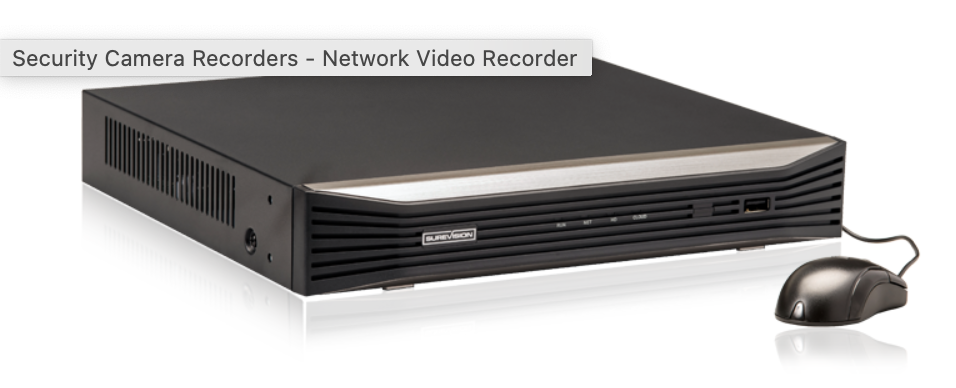Choosing between NVR and DVR recorders is a critical decision when building a CCTV surveillance system for your home or business. This choice impacts cost, installation, video quality, and scalability. At CCTV Security Pros, our security cameras and recorders, trusted by over 75,000 customers since 2008, offer 4K video, no monthly fees, and easy setup. This guide compares NVR and DVR systems, detailing their differences, pros, cons, and ideal use cases to help you decide. One customer said, “CCTV’s systems are plug-and-play—setup took 15 minutes!”
Understanding NVR vs. DVR: Key Differences
The primary difference between NVR and DVR systems lies in the cameras and cabling they use. NVRs pair with IP cameras using Ethernet cables, while DVRs work with analog or HD-over-coax cameras using coaxial cables. These differences affect video quality, installation, and system flexibility.
NVR Systems: IP Cameras and Ethernet Cabling
NVR systems use IP cameras that process video at the camera level, streaming digital footage over Ethernet cables (CAT5/6) via Power-over-Ethernet (PoE). This simplifies installation by combining power, video, and audio in one cable. A user noted, “PoE made wiring my security camera for home so easy!”
- Benefits:
- High Resolution: Support 4K/8MP+ video for crisp details, ideal for identifying faces or license plates.
- Easy Installation: PoE requires one cable per camera; QR code setup connects to free apps in minutes.
- Scalability: Add cameras anywhere on the network, supporting wired or Wi-Fi IP cameras.
- Advanced Features: AI-based human/vehicle detection, audio, and cloud storage options.
- Flexibility: Ethernet cables (up to 328 ft, extendable with switches) are thinner and easier to route than coaxial.
- Limitations:
- Cost: Higher upfront cost for IP cameras and NVRs, especially for new installations.
- Compatibility: Requires ONVIF-compliant cameras for interoperability; check compatibility with CCTV Security Pros’ systems.
DVR Systems: Analog/HD-over-Coax Cameras and Coaxial Cabling
DVR systems use analog or HD-over-coax cameras, transmitting raw video via coaxial cables to the recorder for processing. They’re ideal for upgrading existing analog setups. “I upgraded my old CCTV to 4K with the same cables!” said a customer.
- Benefits:
- Cost-Effective: Lower upfront costs, especially if reusing existing coaxial wiring.
- Compatibility: Supports both analog and HD-over-coax cameras, ideal for phased upgrades.
- Reliability: Stable video transmission without network dependency, great for low-bandwidth areas.
- Features: Modern DVRs offer 4K recording, remote viewing, and smart motion alerts with no fees.
- Limitations:
- Lower Flexibility: Coaxial cables are rigid, requiring direct connections and power outlets per camera.
- Distance: Signal degrades beyond 300–500 ft, limiting camera placement.
- Audio: Limited audio ports; RCA cables needed for audio, not all cameras supported.
- Scalability: Expansion limited by DVR ports and cabling constraints.
Pros and Cons of NVR vs. DVR Systems
Network Video Recorders (NVRs)
Pros:
- Superior Video Quality: Up to 4K/8MP resolution with H.265 compression for efficient storage.
- Easy Setup: Plug-and-play PoE and QR code app setup streamline installation. “Scanned the code, and my security camera for business was live!” said one user.
- Scalability: Easily add cameras across large properties using network switches or Wi-Fi.
- Smart Features: AI-powered motion detection reduces false alerts; supports two-way audio.
Cons:
- Higher Cost: More expensive upfront, especially for new setups without Ethernet infrastructure.
- Network Dependency: Requires a stable network for optimal performance.
Digital Video Recorders (DVRs)
Pros:
- Affordable: Lower cost for cameras and recorders, ideal for budget-conscious users.
- Compatibility: Works with existing coaxial wiring, perfect for upgrading old systems.
- Reliable: No network needed, ensuring consistent recording in remote areas.
Cons:
- Lower Flexibility: Rigid cables and port limitations restrict placement and expansion.
- Video Quality: Typically lower than NVRs, though 4K is now available.
Which System Is Right for You?
NVR Systems are best for:
- New installations with CAT5/6 wiring, like modern homes or offices.
- Large properties needing scalable, high-resolution surveillance.
- Users wanting advanced features like AI analytics and wireless options.
DVR Systems are ideal for:
- Upgrading existing analog systems with coaxial wiring.
- Budget-conscious users or small businesses with limited areas to monitor.
- Locations with unreliable internet, as DVRs don’t rely on networks.
Visit our Learning Center for setup tips tailored to your needs.
FAQs About NVR vs. DVR Systems
Do NVR or DVR systems require subscriptions?
No, CCTV Security Pros offers free remote viewing apps and alerts with no monthly fees.
Can I use existing coaxial cables with an NVR?
No, NVRs require Ethernet cables, but DVRs can use existing coaxial wiring for HD-over-coax cameras.
What’s the best resolution for surveillance?
4K/8MP is ideal for both NVR and modern DVR systems, capturing fine details like faces or license plates.
Shop NVR and DVR Systems at CCTV Security Pros
Build a custom CCTV system with CCTV Security Pros’ security cameras for home or security cameras for business. Our NVR and DVR systems deliver 4K video, smart alerts, and a 3-year warranty with no subscription fees. Need help choosing? Contact us at 888.653.2288 or explore our Learning Center for expert guidance!
[embedded content]
https://www.cctvsecuritypros.com/articles/nvr-vs-dvr-choose-the-right-cctv-system-for-home-business/

